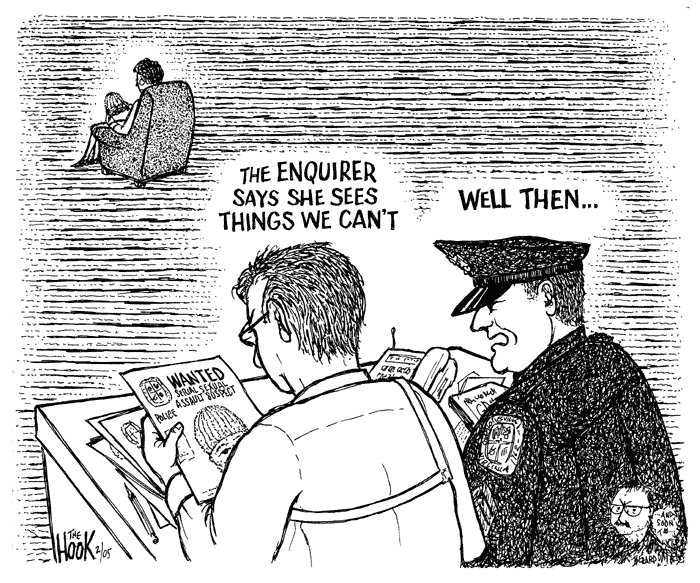Medium rare: Psychic offers help in rapist hunt
"I knew you'd call," says Noreen Renier's voicemail message, a hint of her alleged extrasensory powers the nationally known psychic has offered to Charlottesville police. Renier wants to lend her talents to the hunt for the serial rapist who's sexually assaulted at least seven women since 1997.
"I met with [Police Chief Tim Longo], explained how I worked and offered my services for free," says Renier, who lives in a log cabin in Free Union and usually charges police $650 for her services.
Among her many television appearances are Court TV's Psychic Detective, Good Morning America, and America's Most Wanted.
She also turns up regularly in the pages of the National Enquirer, most recently in the January 17 issue, where Oxford, Ohio, police call "uncanny" her instructions for finding the body of an 81-year-old professor with Alzheimer's disease who had been missing for six months– although a hunter discovered the man's body before police did.
Her fame hit new heights nearly two years ago in the infamous disappearance of eight-months pregnant Laci Peterson. Renier was hired by the family of husband Scott Peterson to help find Laci, and Renier says she knew the murdered woman's body was in the San Francisco Bay several weeks before it washed ashore.
Renier has received many police endorsements, including from the Staunton police, with whom she worked on a serial rapist case in the late 1970s. Although that case ultimately was solved by a stakeout, lead investigator Lacy King says that many details Renier provided were accurate.
The psychic has drawn her share of skeptics as well, including John Merrell, whom she successfully sued for libel in 1986 when he accused her of being a "fraud."
Gary Posner of the Tampa Bay Skeptics, a group dedicated to debunking paranormal power, has been a devoted Renier watcher for over 10 years and writes articles challenging her findings.
Renier says she doesn't solicit cases and never works on one unless she's called in by the police or the family of a missing person– except in this case in her own backyard.
"I'm dealing with victims all the time," she says. "I can understand the fears of women. This is a community suffering, not just one person."
Renier describes her technique as psychometry: she touches something belonging to the victim or that the person being sought has touched and picks up information from that.
And she doesn't claim to solve cases– the police still must do that. "I give them images and pictures," she says. "They have to put all my information together and figure it out."
"I have not made a decision about whether that's something we're going to pursue," says Longo, who's never used a psychic before.
Several members of his force have worked with Renier in the past. In 1982, she was called in on the disappearance of 12-year-old Katie Worsky, whose body has never been found. Glenn Barker ended up serving nine years of an 18-year sentence for second-degree murder in that case.
"I saw there was no value added to the case," Captain Chip Harding told The Hook in 2003. "I'm not passing judgment on her psychic abilities."
Lieutenant. J.W. Gibson has also worked with Renier. "I would recommend police departments depend on [their own] investigations and scientific investigations," he said. "I'll leave it at that."
Other law enforcement members are more enthusiastic about Renier. Former FBI agent Robert Ressler invited her to lecture at the FBI Academy in Quantico in the early '80s.
"I worked on several cases with her," says Ressler, now a consultant in Fredericksburg. "She worked with me– not the FBI, because the FBI never condoned working with a psychic."
He mentions that Renier helped find a downed aircraft carrying FBI personnel and says that she predicted in 1981 that President Ronald Reagan would be shot.
Ressler estimates he's referred "dozens" of law enforcement officers to Renier. He says that while he doesn't endorse psychic detective work, he doesn't refute it, either. "It can be useful. It can produce additional leads. It can solve cases," he says.
He compares Renier's work to his own as a criminal profiler: "Sometimes it gets results, sometimes not."
As for Renier's psychic abilities, "I don't think there's any question," he says. "She's been tested at Duke University."
Court TV checks out people very carefully, notes Ressler. "The fact that Court TV is backing her is proof she's legitimate," he claims.
Longo is still weighing input from those working on the serial rapist case. "I've heard both opinions," he says. " 'What have you got to lose? Maybe she'll trigger something,' and 'Hey, Chief, I don't know about this.' "
Does the January 11 sexual assault in Belmont– in which the attacker used a similar method to past attacks but which has not been genetically linked to the serial rapist– increase the pressure to try any means, however unorthodox, to find the predator?
"I don't think it raises any sense of urgency with respect to [Renier]," says Longo. "It raises a sense of urgency for that particular community." The most recent assault was the second attack in Belmont after many of the rapist's earlier attacks had been in the university area.
"Now we're across town in another neighborhood," Longo says. "If I didn't feel any urgency, I wouldn't be doing my job."
Renier acknowledges that many are skeptical of her work but says she believes the majority of police investigators are open to something new. "They reach a dead end," she observes. "They never call me at the beginning of a crime."
As for Longo, he knows whatever decision he makes about the psychic is sure to draw criticism. "It's a double-edged sword," he says.

Psychic investigator Noreen Renier doesn't understand why local police haven't called her in to help find the serial rapist.
PHOTO BY LAUREN BROOKS

#